(**) Disclosure: This post may contain affiliate links, meaning our company, JCHQ Publishing will get a commission if you decide to make a purchase through the links, but at no additional cost to you.
To become a notary loan signing agent in Montana, an applicant must
- Meet the state-eligibility requirement;
- Complete at least 4 hours of notary training
- Pass the Montana notary exam
- Obtain a $25,000 surety bond
- Submit an online notary application and pay the $25 fee
- Review the notary certificate of commission
- Purchase the notary seal
- Maintain a business journal
- Familiarize with the Montana Notarial Acts
- Keep up with notarial best practice
Although you could work on different types of documents, the loan signing business in the real estate market seems to be a lucrative niche.
So what does a loan signing agent do? When people are getting a mortgage to purchase a house, or they need to refinance their property, there will be loan documents involved. Your role as a notary loan signing agent is to walk through the set of loan documents with the borrower and witness them in signing the paperwork.
You would also need to verify the identity of the signers, place the notary stamp on the signed documents, then send them back to the signing services company or closing attorney.
But keep in mind that you should NOT be providing legal advice, and you cannot explain the terms of the loan documents to the borrower.
In this guide, you’ll find out the steps to become a notary in Montana, income updates, and FAQ about this profession.
But before we start, I want to give a brief disclaimer. This post is not intended as legal advice or state/federal notary public training. It is for general information only. Please check with your state to be sure that loan signing agents are utilized in the closing process. Always follow your state’s notary laws and best practices.
Would you like to learn how to make $75 to $200 per signing appointment? You must check out the Loan Signing System from Mark Wills. (**) This is one of the best training programs for loan signing agents. Many students have achieved remarkable business success after taking this program.
A Table Summary to Become a Notary in Montana
| Age | Notary Course | Exam | Surety Bond | Term of Office | Application Fee |
|---|---|---|---|---|---|
| At least 18 | Yes | Yes | $25,000 | 4 years | $25 |
10 Steps to Become a Notary in Montana

Step 1: Meet the eligibility requirement
- At least age 18 of age
- Resident of Montana/ OR have a place of employment or practice in Montana/ OR have a spouse or legal dependent who is an active military personnel stationed in Montana
- Citizen or permanent legal resident of the U.S
- Able to read and write English
- Not disqualified according to Montana Code Annotated §1-5-618
Step 2: Complete at least 4 hours of notary training
To ensure that you are well equipped with the necessary knowledge to perform notarization, you must take at least 4 hours of notary course.
The curriculum should cover the duties and responsibilities of a notary, proper ways to notarize documents, the notarial acts, maintaining notarial records, remote online notarizations, and more.
Also, you must take it from a course provider that is approved by the Montana Secretary of State.
Below is the list of Approved Notary Course Providers in Montana:
| Notary Provider | Course Name | Credit Hours | Type of Applicant | Cost |
|---|---|---|---|---|
| American Society of Notaries | Essential MT Notary Education | 4 | New/ Renewing | $30 |
| National Notary Association | Montana Notary Education | 4 | New/ Renewing | $59 |
| Notary Public Underwriters | Notary Fundamentals | 4 | New | $30 |
| American Association of Notaries | Montana Notary Course | 4 | New/ Renewing | $25 |
| Montana Credit Union Network | Notary Public Training | 4 | New/ Renewing | $45 |
| National Notary Association | Signing Agent Training | 2 | Renewing | $35 |
| Montana Land Title Association | Beyond the Stamp | 2 | Renewing | Coming Soon |
| National Notary Association | Montana Certified RON Training | 2 | Renewing | $39 |
Source: Montana Secretary of State – Academy Notary Education (Sept 08, 2020)
All the above courses are to be taken online. Also, as you can see, not every program is designed for the initial application. Some are for renewing the notary commission, which I will talk about in the later sections.
Step 3: Familiarize with the Montana Notarial Acts
As a notary signing agent, it is important to understand the Montana notary laws and regulations. After all, you must know what you can do and cannot do.
In addition to taking the notary course, an excellent resource is the “Montana Notary Public Handbook.”
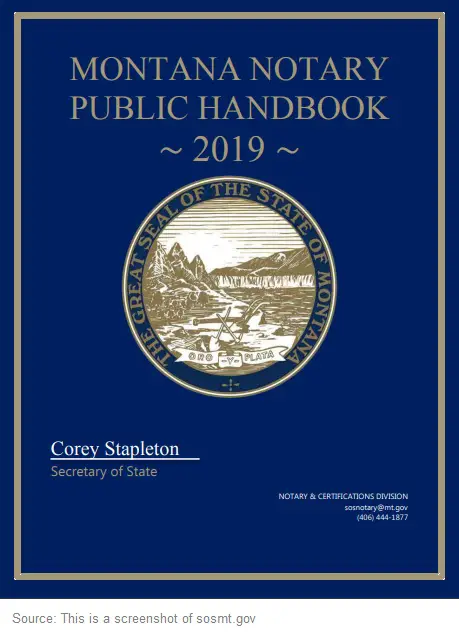
This is a 63-pages comprehensive guide that consists of six chapters:
- General Information
- Becoming a Notary Public
- Notarizing Documents
- Type of Notarial Acts
- Specialized Information
- Montana Notary Laws and Rules
Studying the handbook is also a great way to prepare for the exam. You can find the link of this guide in the reference section of the post.
Step 4: Pass the Montana notary exam
The exam is to test how familiar you are with the Montana notarial acts. It consists of 50 questions, and you’ll have 1 hour in writing it. This is an online exam where you need to create an online account first.
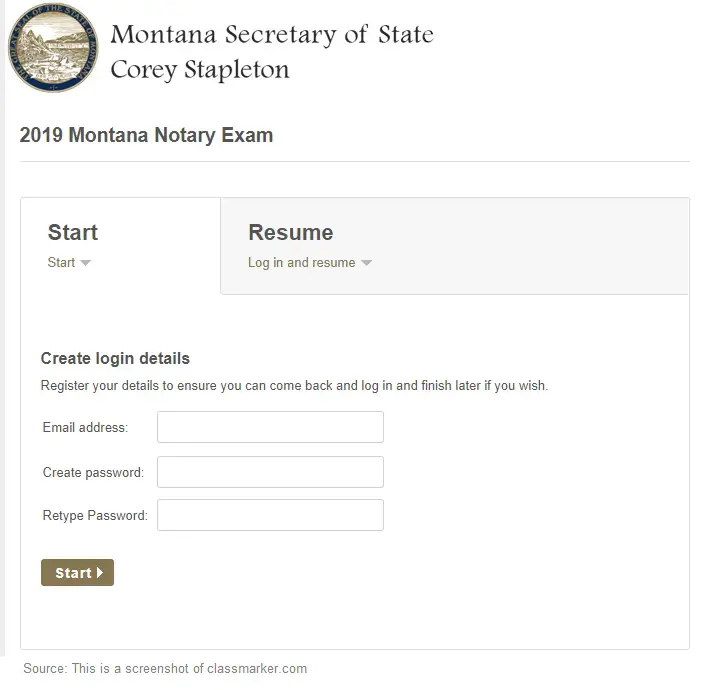
If you cannot complete the exam in a single session, you will have to start over. The required passing score is at least 80%, and you’ll have three attempts. If you fail all three times, you may retry after three months.
After you pass the exam, you will receive the Notary Public Examination Certificate.
Step 5: Obtain a surety bond

The Secretary of State requires you to purchase a $25,000 surety bond with a 4 years term. You may get it from a licensed surety such as a notary bonding company, an insurance company, or a notary organization. You could search for them online.
Note that the surety bond is to protect those for whom the notary public performs a notarization, but not you as a notary public. If you need coverage for your practice, you should consider getting an Error & Omission insurance (E&O).
I just checked with a surety bond issuer. Below is their premium structure.
| Coverage | Premium |
|---|---|
| $25,000 without E&O coverage | $50 |
| $25,000 bond with $10,000 E&O coverage | $75 |
| $25,000 bond with $20,000 E&O coverage | $95 |
| $25,000 bond with $30,000 E&O coverage | $115 |
Source: Suretybonds.com (Sept 8, 2020)
Step 6: Submit the application to the Montana Secretary of State

The Montana Secretary of State is responsible for appointing and commissioning notaries. You need to create an epass account and fill out the application on their website.
Most of the questions in the application are pretty strict forward—for example, your name, business address, background info. It’s better to check that the name on the application will be the same as when you are notarizing documents.
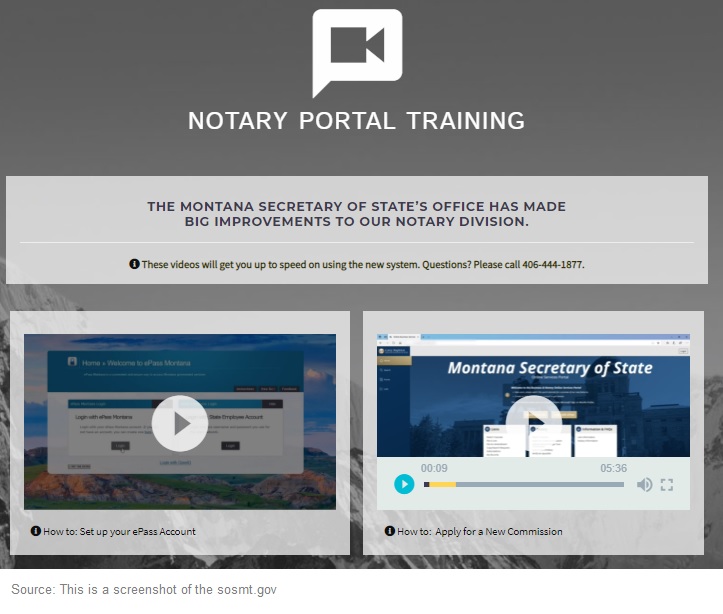
During the application process, you’ll need to upload the Bond Certificate, Notary Public Examination Certificate, and a Notary Course Completion Proof.
There is a $25 filing fee. You may pay it with a credit/debit card or an eCheck.
If you need help in applying, you may watch the video tutorial in the Notary Portal Training.
Step 7: Review the notary commission certificate
You may log in to the ePass account to check the status of your application. Once it is approved, you may download the Notary Commission Certificate from the portal.
It is a good idea to review and make sure all the details on the commission are correct. (e.g., your name, city of residence, tern of commission).
Step 8: Get a notary seal

To start a signing services business in Montana, you may use a notary seal. It is a helpful business tool that ensures you won’t leave out any required details. It indicates the signing agent as an impartial witness and helps to prevent fraudulent acts.
You may purchase the notary seal from office supplies store. Its design must comply with the regulatory rules.
As of October 1, 2013, all Montana notaries are required to have an ink stamp unit, rectangular in shape and approximately 1” x 2 ½” in size, that contains a seal (as described below) and the additional statutorily mandated information:
the notary’s printed name; the title, “Notary Public for the State of Montana”;
the words, “Residing at” with the name of the city or town where the notary lives;
and the notary’s commission expiration date, shown as Month/Day/Four Digit Year.
The stamp may be either blue or black ink only.
Quote from Montana Secretary of State website – Notarial Seal/ Stamp
Here is a sample of a Montana notary seal:
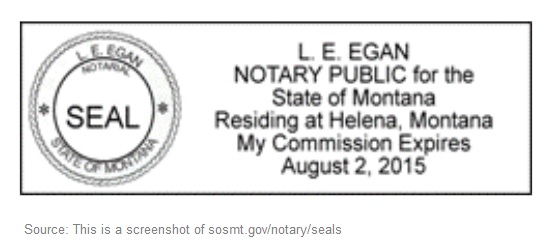
Note that the rectangular border is a mandatory part of the notary seal. Since the seal contains the commission expiry date, you need to get a new one for each term of office.
You may find the list of recommended vendors on the Montana Secretary of State website.
Step 9: Maintain a notary journal

As a notary signing agent in Montana, it is good to maintain a journal of all the notarial acts. Keeping a good record of your notary acts is an essential part of good business practice. It could serve as proof that you have taken reasonable steps to identify the signer of a document.
If your journal is maintained in a physical format, you should have one bounded with pre-printed pages. You may find it at stationery, office supply stores, or through notary associations. Also, you cannot have more than one active journal at any even time.
Whereas for a journal in an electronic format, it needs to be a permanent, tamper-evident. Make sure that it is complying with the rules of the Secretary of State.
Each journal entry must include
the date and time of the notarization;
the type of notarial act,
a description of the document (usually the document date and type);
the type of identification used;
the signature, printed name, and address of the person for whom the notarial act was performed (signatures are not required for certified copies or remotely notarized documents);
and the fee (if any) charged for the notarization.
Quote from Montana Notarial Public Handbook – Notarial Journal
Step 10: Keep up with notarial best practice
Continuing education is critical to being a notary signing agent. Rules and regulations would change over time. Also, there will be new technology to advance your business practice. A good way is to take high-quality courses from a trusted provider.
Learn to earn as a Loan Signing Agent
Without sufficient income, you are just doing it as a hobby and not a real business. The first step you should take is to learn how to build a “PROFITABLE” notarial practice.
But this could take years of trial and error in coming up with a feasible strategy. Rather than reinventing the wheel, a MUCH better way is to learn from someone who has done it before successfully.
Mark Wills is a top-notch coach for notary signing agents. He developed the Loan Signing System (LSS) training program, where many of his students have achieved massive success. Some can earn great money as a side-gig, where some are earning over six-figures every year.
You may click here to check out his training program. (**)
Advance your credential by becoming an NNA Certified Notary Signing Agent
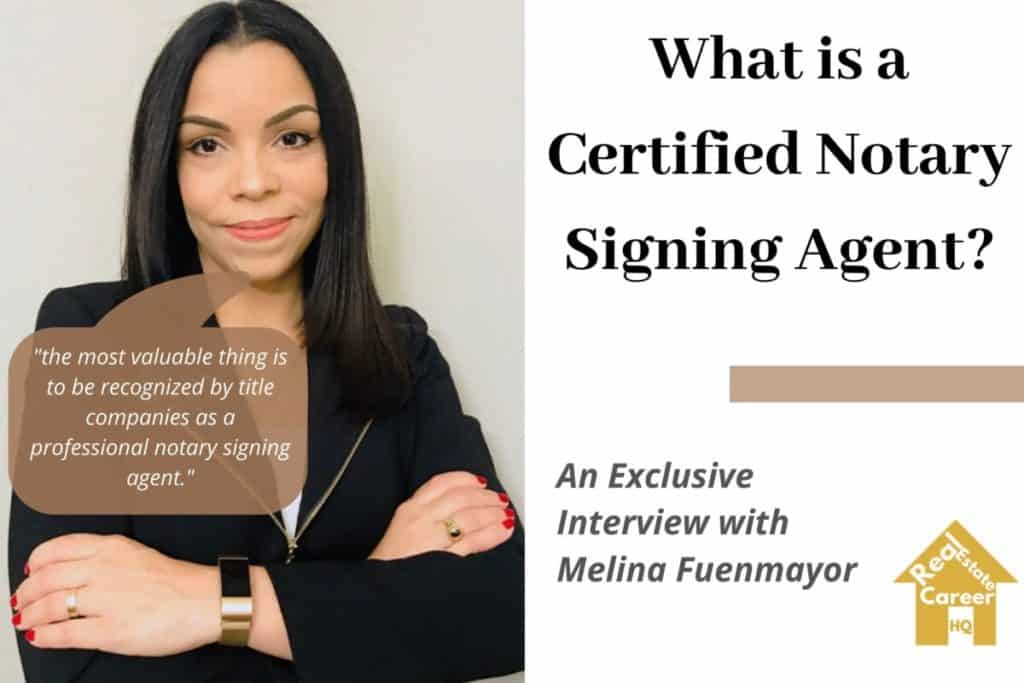
The National Notary Association (NNA) is one of the largest associations and most recognizable for notaries. They provide regular updates, training and networking events to the members.
Getting the NNA Certified status can show to title and escrow companies that you are maintaining a high standard as a signing agent. Thus, strengthen their trust and confidence in your signing services.
>>Here is a review I wrote about the NNA Certified Notary Signing Agent Program<<
In there, you can find an exclusive interview I had with Melina Fuenmayor. She will share with you her thoughts in obtaining the certified credential.
Does Montana allow electronic notarization or remote online notarization (RON)?

I like states that have the option for notaries to work digitally. Doing so could bring you great convenience to streamline your notary practice.
You can perform both “electronic notarization” and “remote online notarization” in Montana.
But let me briefly describe the differences between the two types of digital notarization.
In-Person Electronic Notarization (IPEN), also known as “e-notariation” is where the signings and document transmission can be done electronically. But you’ll still need to meet the signer in-person to verify their identity. This meeting must be conducted within the state of Montana.
An electronic notarization would involve:
- Electronic document
- Digital notary seal
- Digital signatures of the notary and signer
Remote online notarization (RON) allows you not to be physically present with the signer. Instead, you would verify their the signer’s identity through video and audio conference.
Interestingly, although you, the notary, must be physically located in Montana, the signer can be anywhere during the RON. I have written notarization for many other states, and this indeed is not a common practice.
Remote notarization involves:
Quote from Montana Notary Public Handbook
Personal appearance via communication technology of the signer(s) and the notary
Paper (tangible) document, which has been signed and subsequently delivered to the notary (the notary has the actual signed document)
Wet signatures of the signer and the notary
Ink impression of the notary’s seal/stamp
Acknowledgments are the only notarial act that can be performed in this manner
To become an e-notary or remote online notary, you must:
1) Complete an approved course
To ensure you are familiar with the technology for digital notarization, you are required to complete a system training course from an approved provider. You also need to pass the exam based on the course.
2) Choose a technology provider
As a notary signing agent, you would be handling documents with confidential details. Therefore, it is critical to choose a technology platform with a high level of security.
Below is a list of approved technology providers I found on the Montana Secretary of State website.
- Figure Technologies – For in-house Figure employee notaries only
- Notarize
- NotaryCam
- Pavaso
- SafeDocs
- Simplifile – For IPEN only
- World Wide Notary
- DocVerify
- Nexsys
- SigniX
- Digital Delivery
- Synrgo
- eNotaryLog
3) Register at the Secretary of State
When you apply for the initial commission through the ePass portal, you may select to register as an electronic notary and remote online notary.
As part of the application procedure, you also need to submit:
- Proof of course and exam completion
- Montana Notary Public Information Update form
How to become a mobile notary in Montana?
Some signers cannot travel to your office in signing the documents, and they do not have the technology to perform the remote notarization. In such a situation, there would be a demand for a mobile notary. In short, a mobile notary is merely a notary that travels around in meeting signers.
To become a mobile notary in Montana, an applicant must:
- Register with the Secretary of State as a notary. This is basically the same notary commission certificate, as discussed earlier. You don’t need to get a new one.
- Have ease of transportation. It is better to have your own car so that you could conveniently drive between appointments.
- Setup essential equipment: A mobile printer and an approved electronic notarization platform allow you to work on the documents whenever and wherever. You may check out our resource page for amazingly helpful tools that could streamline your business.
How much do notary loan signing agents make in Montana?

The average annual income of Loan Signing Agents in Montana is $51,371. The income typically ranges between $28,163 to $57,266. Top earning loan signing agents in Montana are making over $85,430.
As a notary, you could work on different documents, but the loan signing in the real estate market could be a lucrative niche.
Top 10 Highest Paying Cities for Loan Signing Agents in Montana
| City | Annual Salary |
|---|---|
| Miles City | $52,444 |
| Helena | $48,284 |
| Belgrade | $47,178 |
| Billings | $47,013 |
| Kalispell | $46,075 |
| Great Falls | $45,174 |
| Bozeman | $45,067 |
| Butte | $44,590 |
| Havre | $44,393 |
| Missoula | $42,211 |
source: ZipRecruiter (March 13, 2022)
Can you make over $10,000/month as a loan signing agent? Be sure to check out our notary earning guide. You’ll find a case study where a loan signing agent has built her business to such a successful figure.
Is there demand for notary loan signing agent in Montana?
As long as people are obtaining mortgages or refinancing their homes, there would be a demand for notary loan signing agents.
All originated mortgages in Montana
| YEAR | RECORDS |
|---|---|
| 2017 | 24,577 |
| 2016 | 26,863 |
| 2015 | 25,376 |
| 2014 | 21,159 |
| 2013 | 31,007 |
| 2012 | 31,452 |
| 2011 | 23,529 |
| 2010 | 27,263 |
| 2009 | 36,202 |
| 2008 | 26,278 |
| 2007 | 31,811 |
Source: Consumer Financial Protection Bureau – Home Mortgage Disclosure Act (HMDA) (Sept 09, 2020)
According to the Montana Notary Search database, there are 1500 active notaries. Out of all the active notaries, only 74 can perform electronic notarization and 45 for remote online notarization.
If you want to maintain a competitive edge, you definitely should consider incorporating e-notary and RON in your practice.
Some states are “Attorney States,” which means only attorneys can coordinate the closing paperwork of a real estate. Whereas, others are “Escrow States” where escrow companies would handle the mortgage closing.
According to the First American Title, Montana is not an “Attorney State.”
If you want to succeed in the loan signing industry, you must check out this loan system training program. If you review the testimonials of his students, you’ll be amazed at how the notary career changes their life after they learned from Mark Wills. (**)
How much does it cost to become a notary loan signing agent in Montana?

It costs approximately $57 to become a notary loan signing agent in Montana.
Here’s a breakdown of the costs to start a notary signing business
| Notary Application Fee | $25 |
| Notary Seal | $17 |
| Journal | $15 |
There could be other expenses involved, travel expenses, car maintenance, auto insurance, remote notary technology, laptop and other business supplies.
Can a felon be a notary in Montana?

Having a conviction for a felony may impact the application to become a notary in Montana. The Secretary of State needs to make sure that you are a person with credibility, truthfulness, and integrity to fulfill the responsibilities of the position.
In the notary application, it will ask the following questions:
Within the last 10 years, have you been convicted of a felony or crime involving fraud, dishonesty, or deceit?
Within the last 10 years, have you been found in any legal proceeding or disciplinary action to have acted fraudulently, dishonestly, or deceitfully?
Within the last 10 years, have you had a notary commission denied, revoked, or restricted in any state?
Quote from Notary Public Application
If you answer “Yes,” you will need to attach a detailed written explanation and associated document.
However, having a felony does not necessarily mean your application will automatically be declined. It depends on the severity and nature of the conviction. The Montana Secretary of State would review it on a case-by-case basis.
1-5-621. Grounds to deny — terms for refusing to renew, revoking, suspending, or conditioning notary public commissions.
(1) The secretary of state may deny, refuse to renew, revoke, suspend, or impose a condition on a commission as a notary public for any act or omission that demonstrates the individual lacks the honesty, integrity, competence, or reliability to act as a notary public, including:
…
(c) pending release from supervision, a conviction of the applicant or notary public of any felony or crime involving fraud, dishonesty, or deceit, although conviction of a criminal offense is not a complete bar to receiving a commission if the individual’s full rights have been restored;
(d) admission by the applicant or notary public or a finding in any legal proceeding or disciplinary action of the applicant’s or notary public’s fraud, dishonesty, or deceit;
Quote from Montana Notarial Public Handbook
How long does it take to become a notary loan signing agent in Montana?
It takes less than one month to become a notary loan signing agent in Montana. After the Secretary of State receives your application and all the required documents, they will notify you within 30 days.
Once everything is in good order, the Secretary of State will send you the notary certificate. Then you could purchase the notary seal and journal.
Since you must submit your application within 6 months of passing the exam, the Secretary of State suggests that you write the exam before obtaining the notary bond.
How to renew notary commission in Montana?

You must renew the notary commission every four year. The renewal steps are similar as you were applying for the initial application.
- Take at least four hours of continuing education within 12 months preceding application OR two hours in each of the preceding 3 years
- Pass the notary exam
- Submit the renewal application to the Secretary of State
- File a new surety bond
- Get a notary seal with a new commission expiry date
You can start the renewal process within 30 days that your current commission will expire. But to avoid an interrupted business period, don’t wait till your current notary commission is expired.
Can I notarize for a family member in Montana?

You must not notarize any documents where you have any financial or beneficial interest in the transaction. Therefore, notarizing a document for any family member could call into question, and such practice should be avoided.
I have more questions about being a notary public in Montana, where could I obtain more details?
You may contact the Notary and Certifications Division of the Secretary of State’s office at sosnotary@mt.gov.
Here’s a Snippet of What Stephanie Espinal Think about Being a Notary Signing Agent!

“My advice is that don’t be afraid to start the loan signing career on a part-time basis. I would also tell them that they need to be passionate about the profession and not just because of the money. They must dedicate their time to learning the business and notarial laws from your state.
You will be working with people’s financial lives and any mistake you make with cause them a lot of money.”
– Stephanie Espinal, Notary Loan Signing Agent
Here’s an exclusive interview with Stephanie. In there, she shared what it takes to be a notary signing agent as a side gig, her valuable journey, and secret sauce to success.
Disclaimer: The information in this post is for general information only, and not intend to provide any advice. They are subjected to change without any notice, and not guaranteed to be error-free. Some of the posts on this site may contain views and opinions from individual not related to JCHQ Publishing. They do not necessarily reflect our view or position.
(**) Affiliate Disclosure: Please note that some of the links above are affiliate links, and at no additional cost to you. Our company, JCHQ Publishing will earn a commission if you decide to make a purchase after clicking on the link. Please understand that we include them based on our experience or the research on these companies or products, and we recommend them because they are helpful and useful, not because of the small commissions we make if you decide to buy something through the links. Please do not spend any money on these products unless you feel you need them or that they will help you achieve your goals.
Reference:
- First American Title- Your Guide to Real Estate Customs by State (source)
- Montana Secretary of State (source)
- Salary.com – Notary Signing Agent Salary in Montana (source)
- ZipRecruiter – Loan Signing Agent Salary in Montana (source)
- SuretyBonds.com – Montana Notary Bond (source)
- Consumer Financial Protection Bureau – Home Mortgage Disclosure Act (HMDA) (source)


